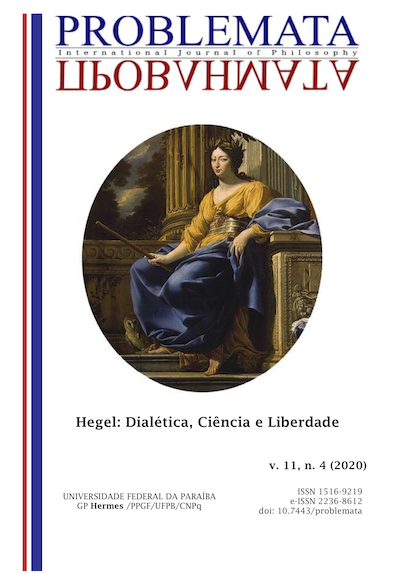THE TREE OF KNOWLEDGE:
THE DIALECTIC OF THE ETERNAL MYTH OF MAN ACCORDING TO HEGEL
DOI:
https://doi.org/10.7443/problemata.v11i4.56367Keywords:
Religion, Original sin, Evil, Freedom, DialeticAbstract
This paper aims to investigate the dialectical nature of the myth of original sin as described by Hegel. For introductory purposes, I will briefly highlight the process by which Hegelian philosophy operates the translation from religious representation to concept, demonstrating how this reading is at the basis of the interpretation of the myth. Then I will analyze the functioning of the dialectical movements of the biblical episode of Genesis 3 within the Phenomenology of Spirit and the Lectures on the Philosophy of Religion, in order to discuss the issues of good and evil, innocence and guilt, will and arbitrariness. In this reconstruction the dialectic will emerge in its importance as a structure that permeates human consciousness as well as reality in general. In the specific case of the tree of knowledge, we will witness the concretization of this eternal conciliation of contradictions in two specific areas, which will be treated in the last section: the question of evil on the one hand, which will be demonstrated as a necessary negative element that triggers the dialectical movement itself, and the question of freedom on the other, which will appear as the result of the emancipation of the subject from the natural state in which he finds himself in the so-called "garden of animals".
Downloads
References
Bibliografia primaria
HEGEL, G.W.F. Enciclopedia delle scienze filosofiche (trad. it. di V. Cicero), Milano: Rusconi, 1996
______. Fenomenologia dello Spirito (trad. it. di V. Cicero), Milano: Bompiani, 2016
______. Lezioni di filosofia della religione (trad. it. di R. Garaventa e S. Achella), voll.I-III, Napoli: Guida, 2003
______. Lezioni di filosofia della storia (trad. it. Di G. Bonacina e L. Sichirollo) Roma-Bari: Laterza, 2003
______. Lezioni sulla filosofia della storia (trad. it. Di G. Calogero e C. Fratta), voll.I-IV, Firenze: La Nuova Italia, 1941
______. Lineamenti di filosofia del diritto (trad. it. di V. Cicero), Milano: Bompiani 2006
______. Recensione a Göschel in: Scritti berlinesi (a cura di M. del Vecchio), Milano: Franco Angeli, 2001
______. Scienza della logica (trad. it. di A. Moni), voll. I-II, Bari: Laterza, 1981
Bibliografia secondaria
ANTELLI, Mauro. Stato di natura e peccato originale in Rousseau ed Hegel in: ACME, vol.43, n.1, Milano: Ledizioni, 1990, pp. 5-16
BORDIGNON, Michela. Il falso non è mica il diavolo. Falso e negativo tra “Prefazione” e “Introduzione” in: Sostanza e soggetto. Studi sulla <> alla Fenomenologia dello spirito di Hegel (a cura di G. Garelli e M. Pagano), Bologna: Pendragon 2016
CARAMELLI, Eleonora. Lo spirito del ritorno. Studi su concetto e rappresentazione in Hegel, Genova: il melangolo, 2016
CORTELLA, Lucio. L’etica della democrazia. Attualità della Filosofia del diritto di Hegel, Genova-Milano: Marietti, 2011
GARELLI, Gianluca. Dialettica e interpretazione. Studi su Hegel e la metodica del comprendere, Bologna: Pendragon, 2015
GÖSCHEL, Karl Friedrich. Beiträge zur spekulativen Philosophie von Gott und dem Menschen und von dem Gott-Menschen, Berlino: Duncker 1838
HYPPOLITE, Jean. Genesi e struttura della «Fenomenologia dello spirito» di Hegel (trad. it. di G.A. De Toni), Firenze: La Nuova Italia, 1999
MANCUSO, Vito. Hegel teologo e l'imperdonabile assenza del "Principe di questo mondo", Casale Monferrato: Piemme, 1996
RICŒUR, Paul. Le statut de la Vorstellung dans la philosophie hégélienne de la religion In: Qu’est-ce que Dieu? Philosophie/théologie. Hommage à l’abbé Daniel Coppieters de Gibson (1929-1983), Bruxelles: Presses de l’Université Saint-Louis, 1985
RINGLEBEN, Joachim. Hegels Theorie der Sünde. Die subjektivitäts-logische Konstruktion eines theologischen Begriffs, Berlin: Walter de Gruyter GmbH & Co KG, 1977
______. Die Dialektik von Freiheit und Sünde: Hegels Interpretation von Gen. 3 in: Biblical Interpretation: History, Context, And Reality, Atlanta: Society of Biblical Lit, 2005
STRAUSS, David Friedrich. La vita di Gesù o esame critico della sua storia (trad. it. di P. Lapertosa e G. Di Iorio), Milano: La Vita Felice 2014
______. Streitschriften zur Vertheidigung meiner Schrift über das Leben Jesu und zur Charakteristik der gegenwartigen theologie, Tübingen: Osiander, 1837
TRILLHAAS, Wolfgang. Felix culpa. Deutung der Geschichte vom Sündenfall bei Hegel, in Probleme biblischer Theologie in: Probleme biblischer Theologie, München: Kaiser 1971, pp. 589-602
VALENZA, Pierluigi. La circolarità di rappresentazione e concetto nella filosofia della religione di Hegel in: Archivio di filosofia, vol.85, n.1, Pisa: Fabrizio Serra, 2017, pp. 63-77
WOLF, Jean-Claude. “Dass der Mensch durch Erkennen unsterblich ist”. Hegel’s Deutung der Erzählung vom Sündenfall in: Freiburger Zeitschrift für Philosophie und Theologie, vol.58, n.2, Freiburg: Editions Saint-Paul, 2011, pp. 453-470
Downloads
Published
Issue
Section
License
Authors who publish with this journal agree to the following terms:
- Authors retain copyright and grant the journal right of first publication with the work simultaneously licensed under a Creative Commons Attribution License that allows others to share the work with an acknowledgement of the work's authorship and initial publication in this journal.
- Authors are able to enter into separate, additional contractual arrangements for the non-exclusive distribution of the journal's published version of the work (e.g., post it to an institutional repository or publish it in a book), with an acknowledgement of its initial publication in this journal.
-
- Authors are permitted and encouraged to post their work online (e.g., in institutional repositories or on their website) prior to and during the submission process, as it can lead to productive exchanges, as well as earlier and greater citation of published work (See The Effect of Open Access).





